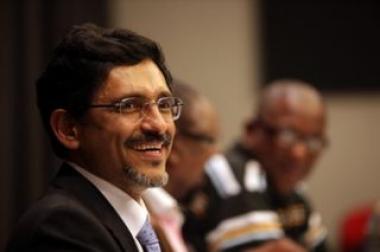Patel outlines new ‘integrity pact’ to screen firms for big-project deals
 Economic Development Minister Ebrahim Patel
Economic Development Minister Ebrahim Patel
As the state ramps up its infrastructure spend, Economic Development Minister Ebrahim Patel has insisted on ‘value for money’
Emboldened by a broadly positive response to infrastructure plans outlined by President Jacob Zuma last week, the government appears to be trying to use the contracts likely to be involved to further bend business and the unions to its "developmental" agenda and its view of how business and labour under a state-led mixed economy should behave.
Yesterday Economic Development Minister Ebrahim Patel said companies wishing to win contracts from the government’s infrastructure development programme would need to sign an "integrity pact" committing them to ethical behaviour, including noncollusion with competitors and competitive pricing.
President Jacob Zuma last week announced an expansion of Transnet’s infrastructure programme to R300bn over seven years. Added to existing plans — which in last year’s budget reached R809bn over three years — and new ones likely to be announced in next week’s budget, the government’s infrastructure spend is set to top R1-trillion.
But, having been burned by cost escalations in previous infrastructure programmes — particularly in the construction of Soccer World Cup stadiums in 2010 — Mr Patel says the government wanted to make sure this time it got "value for money".
Investigations by the Competition Commission have uncovered "clear and compelling evidence of high levels of collusion ( with public-sector tenders) in construction, which has driven up costs", Mr Patel told the Cape Town Press Club yesterday.
Speaking in the state of the nation debate in Parliament on Tuesday, Mr Patel said the government would guard against price collusion, corruption and unnecessary industrial action on infrastructure projects.
"Our experience in the past showed high levels of collusion between contractors that drove up prices. We faced avoidable industrial action on some of the projects," he said.
Mr Patel said the government was in discussion with business and organised labour "to address the need for competitive pricing, firm action against public and private sector corruption and co-operative industrial relations".
In his remarks at the Press Club yesterday, he said he was under no illusion that such a pact would be sufficient to deter anticompetitive behaviour. The Competition Commission would "focus very strongly on the infrastructure programme", and build on the "very substantial work" done in investigating collusion among construction firms.
The commission is investigating 65 bid-rigging cases in the construction sector with an estimated value of R29 bn.
Mr Patel said since the commission had altered its corporate leniency policy in 2007, awarding parties that are first to come clean, "the risks for private companies in colluding had got much higher".
He said "clear consequences" would have to apply where contractors failed to deliver. In the inquiry, leniency was granted to Group Five and applications for leniency were made by Murray & Roberts and Grinaker-LTA.
In his state of the nation speech last week Mr Zuma said government procurement processes were being cleaned up by a multi-agency working group led by the Treasury.
This included a review of "the entire system" and "the vetting of supply chain personnel in all … departments".














